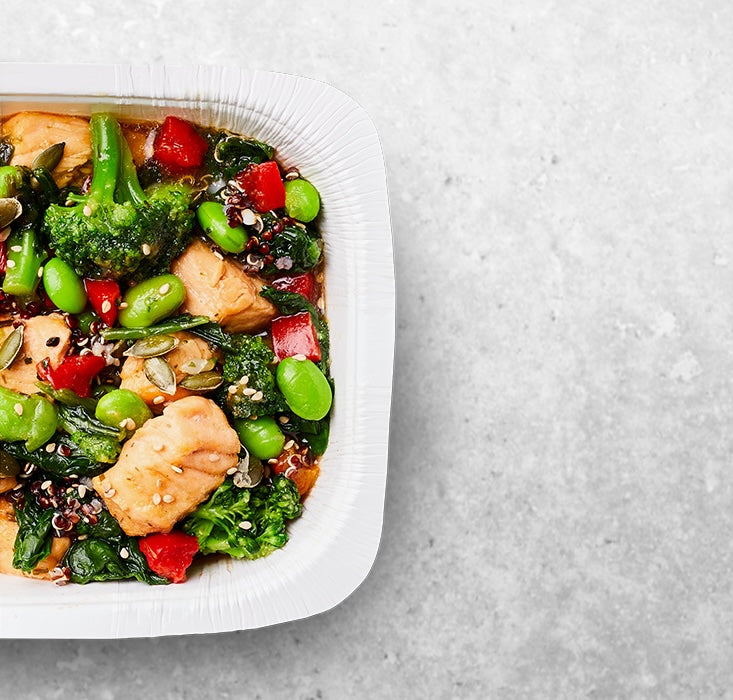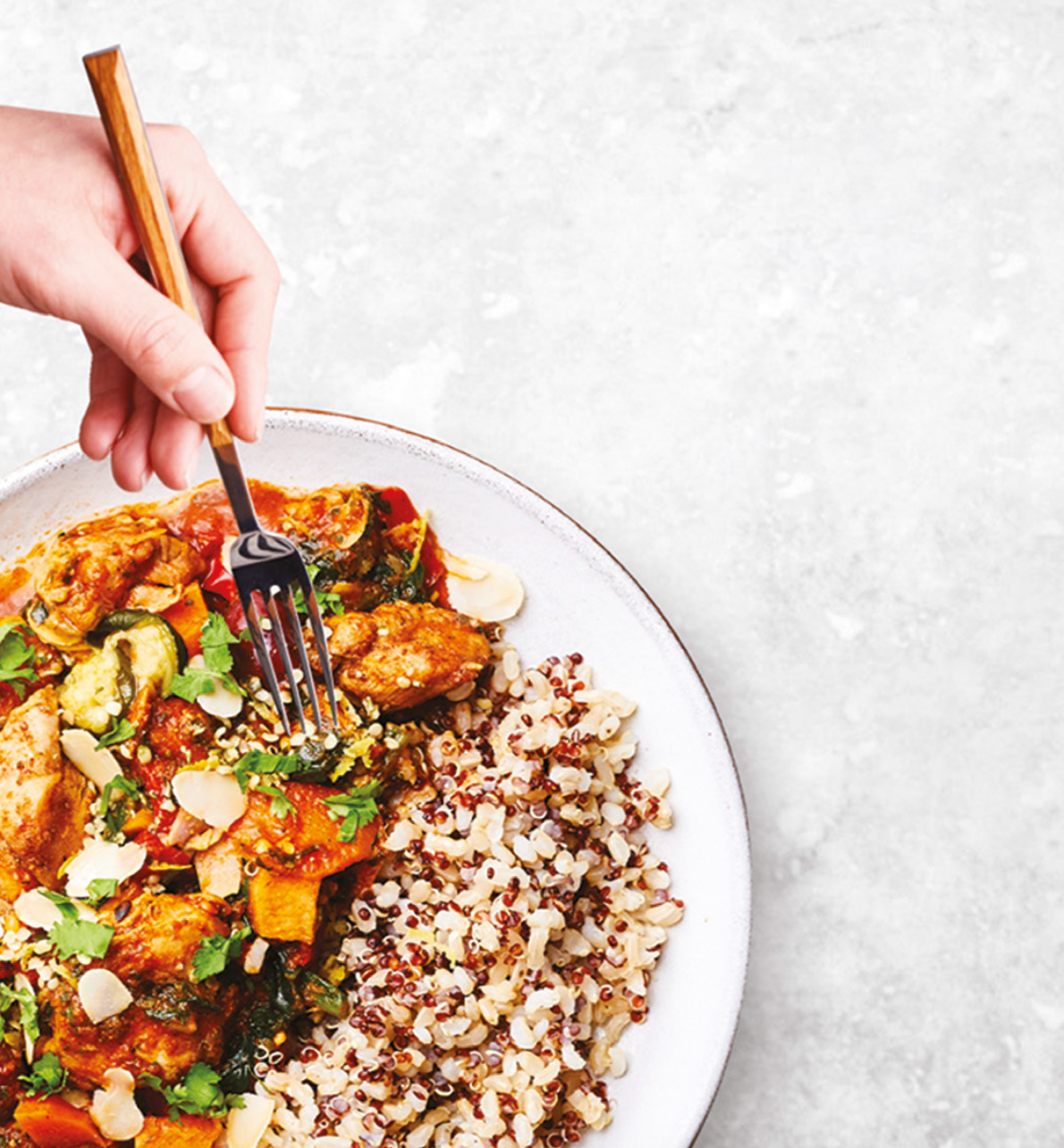
what to eat while using weight management medications
welcome to our guide on making healthy food choices while using weight loss injections.
whether you're new to the medication or have been using it for a while, we hope this guide will help you manage side effects, optimise your results, and feel your best.
managing side effects
side effects from weight loss injections can vary from person to person, and some people might not experience any at all.
the good news is that side effects are usually temporary, and as your body gets used to the medication, they should lessen.
side effects occur because of the way the medications work: they slow down how quickly your stomach empties. this means food stays in your stomach longer, which can lead to side effects like:
- feeling sick
- being sick
- heartburn (a burning sensation in your chest)
- acid reflux (a sour or acid taste in your mouth)
- reduced appetite
Weight loss medications can also affect how food moves through your gut, which might change how often you go to the loo. You might experience constipation and/or diarrhoea.
cravings + emotional eating
many people find that these medications help reduce cravings for unhealthy foods like chocolate and crisps. plus, many report they experience less ‘food chatter’ and they no longer reach for food when feeling stressed or bored. people often feel like they have more headspace as food is on their mind less.
if emotional eating is still a struggle and the medication isn’t helping, chat to your doctor or healthcare team for support. since the medication slows down how quickly your stomach empties, overeating (even just a little) can make side effects worse. it’s important to explore other strategies for managing emotions that work for you, so you can get the most out of your medication

how to manage side effects
feeling sick? try reducing the size of your meals. there’s no one-size-fits-all, so start small and increase gradually. you may find that plainer flavours and cold foods are easier to manage when you’re feeling nauseous
take your time – eat slowly
low appetite? have half a meal now and the rest later
fatty foods like chips, creamy sauces, and fried foods can make side effects worse because they take longer to digest. choose lower-fat options like fruits, vegetables, whole grains, and lean proteins (like eggs, chicken breast, tofu, or beans)
listen to your body and stop eating when you’re full. even a few extra mouthfuls can lead to feeling unwell
if you’re constipated, gradually increase your fibre intake from fruits, vegetables and wholegrains like oats and wholemeal bread and make sure you drink plenty of fluids
struggling with acid reflux? try to eat your last meal at least 3 hours before bed. this gives your stomach time to empty and can reduce the risk of reflux. sleeping on your left side can also help reduce symptoms overnight
eating a healthy, balanced diet on weight management programmes
it’s important to eat a healthy balanced diet alongside your medication, to make sure you get all the nutrients you need to stay healthy. foods like biscuits and crisps are low in nutrients, and if these fill up your stomach, it'll be tricky to get enough protein, vitamins and minerals. skipping meals can lead to vitamin deficiencies over time, so aim to eat 2-3 balanced meals a day.
planning your meals
a simple way to plan a balanced meal is to make sure it includes three things - a protein-rich food, a fibre rich carbohydrate and a portion of fruits/vegetables
protein
protein is important for muscle health and helps minimise muscle loss when losing weight. protein also helps us stay fuller longer, so if you’re finding your side effects are wearing off and you’re feeling hungry, focusing on protein can help. aim for at least a palm-sized portion of protein per meal, or 20-30 grams of protein per meal, and 10 grams per snack.
examples:- 80g chicken breast = 20g
- 1 can tuna = 26g
- 3dsrt spoon lean mince = 22g
- 1 fillet fish, like cod = 20-30g
- 1⁄2 can chickpeas = 9g
- 1⁄2 can (200g) baked beans = 10g
- 2 large eggs = 20g
- firm tofu (100g) = 16g
- 1 scoop whey protein = 30g
- 1 glass semi skimmed milk = 9g
- 1 glass soy milk = 7.5g
carbohydrates
carbohydrates provide us with energy and B vitamins. choose wholegrains like wholemeal bread and oats for fibre, which supports gut health and helps prevent constipation.
examples:- 1 slice bread
- 75g uncooked or 150g cooked pasta (2-3 tablespoons)
- 50g uncooked or 150g cooked rice (2-3 tablespoons)
- 175g potatoes boiled with skin (3 egg sized potatoes of 5-6 thumb sized new potatoes)
- another measure is around 1⁄4 of your plate or a fistful
fruits + vegetables
aiming for 5-8 portions of fruit and vegetables can help your reach your fibre target as well as providing your body with vitamins and minerals. fresh as well as frozen fruits and vegetables like peas and frozen raspberries all count. well as fresh produce. aim for a variety of colourful options to get the vitamins and minerals your body needs.
- 1 large fruit (like a banana)
- 1 medium fruit (like an apple)
- 2 small fruits (e.g., plums or clementines)
- 3 heaped tbsp of vegetables
- 1 cereal bowl of leafy greens
meal ideas
breakfast
1-2 poached eggs on 1x seeded or wholemeal toast with avocado or a drizzle of olive oil. add spinach or tomatoes to include a portion of veg and increase the fibre content
overnight oats
yoghurt and fruit with seeds/nuts
lunch
homemade soup using beans or lentils to add protein and fibre
sandwich – seeded or wholemeal bread with egg/meat/fish/hummus and some salad vegetables
salad – adding in high protein grain such as quinoa and adding in a protein source such as chickpeas/lentils or chicken or fish
evening meal
spaghetti bolognese with wholewheat pasta
tofu stir-fry with whole wheat noodles
veggie chilli with brown rice
field doctor meal
snacks
oat cakes/crackers with nut butter, cream cheese or hummus
handful of nuts/seeds
hummus with vegetable sticks
piece of fruit
pot of yoghurt
glass of milk or soy milk
staying hydrated
as well as feeling less hungry, many people find they don’t feel thirsty when taking these medications. however, drinking enough is important to reduce your risk of dehydration, particularly if you’re experiencing side effects such as vomiting or diarrhoea.
- sip water regularly throughout the day. carrying a water bottle can help remind you to drink, and you’ll be able to see how much you’ve drunk
- aim for at least 6-8 glasses or cups of fluid daily
- avoid fizzy drinks, as they can fill you up and can worsen heartburn and bloating
- water is a great option, but tea and coffee also count towards your fluid intake. just keep in mind that caffeinated drinks can worsen symptoms like diarrhoea
- try no-added-sugar squash or adding fresh fruit to your water to help increase fluid intake. herbal teas are a good choice too, and for some people, ginger tea can help ease nausea
remember!
stop when you’re full! listen to your body – don’t force yourself to finish a meal. try smaller, more frequent meals if you’re struggling and tailor portion sizes to how you’re feeling.
if you’re unable to manage 2-3 small balanced meals a day, speak to your medical team who might want to consider reducing your dose or keeping you on the same dose for longer until you’re able to manage a balanced diet and fluids.

what about supplements?
eating a healthy balanced diet should provide all the nutrients your body needs. however, if you’re experiencing side effects and you’re not able to manage much food then a multivitamin can be helpful. if you’ve had blood tests show low levels of nutrients like iron, vitamin D, or B12, your medical team can advise on the right supplements for you.
got questions?
if you need further support or have a question for our dietitian, you can contact us and we’ll get back to you.
find the right meals for you
browse our ranges.
choose from one of our ranges or personalise your own menu from 60+ meals.
- low FODMAP

- eat well, live well programme

- gluten free

- high protein

- weight management

- ibs

- lowest calorie

- lower carbs

- mediterranean

- smaller range

- pcos

- lean + lighter

- menopause

- heart healthy

- full menu

- gift cards